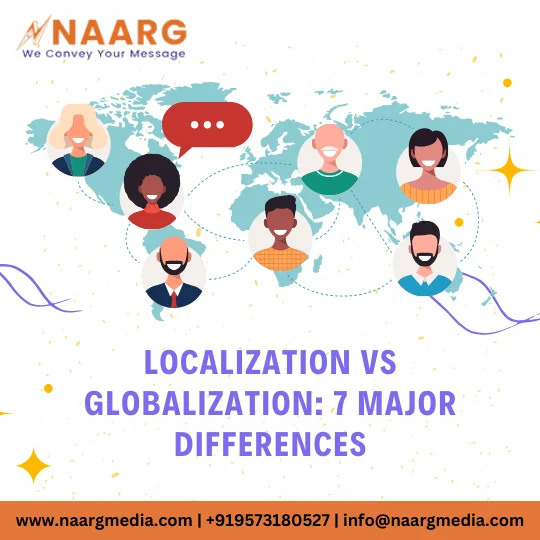Consider multinational corporations such as Amazon, Netflix, Microsoft, and Google. When you think about anything, what immediately comes to mind? The first thing that comes to mind is a global company that offers global services to people around the world. But here is the catch: they are the most localized companies in the world. Did you know that we have around 7164 living languages in our world?
Ever wondered how these big companies are catering to the world and their expectations with so many languages to work on? Yes, you got that right! With the help of localization, No globalization of any company is ever complete without involving localization in the picture.
But it also comes with the localization vs. globalization debate. Hear us out; there is no competition between these processes. And the ideal approach for any business should be to adopt both localization and globalization for their business.
Want to learn more about the localization vs. globalization debate? And how can you choose the optimal one for your company? Then this blog post is for you. In this blog, we will cover everything about the ongoing localization vs. globalization debate and the key differences between localization and globalization.

Role of Localization
Before understanding the role of localization, let’s first define the localization process. Simply put, it is the process of adapting your products or services according to the specific conditions of a specific target market. And this process includes adapting cultural elements, local cultures, native languages, and much more. The localization process plays a pivotal role in your business.
By adapting language, design, and imagery to resonate with specific target markets, localization also enhances the user experience and fosters engagement. Localization goes beyond linguistic translation; it involves meticulous attention to cultural nuances, regulatory requirements, and local conventions in areas like measurement units, date formats, and payment methods.
Having a successful localization process in place not only ensures clarity and relevance but also demonstrates respect for the uniqueness of each of your target audiences. This will ultimately drive greater acceptance and adoption of your products and services in global markets.
Pros and Cons of Localization
As you know, localization is the process of adapting a product or service to meet the linguistic, cultural, and functional needs of your specific target market. But to your surprise, it comes with its own set of pros and cons. Listed below are some of the pros and cons associated with localization.
Pros
1. Enhanced User Experience
Localization is the process that makes your products more accessible and appealing to your users by providing content in their respective native languages and addressing cultural nuances. This leads to increased user engagement and satisfaction.
2. Market Expansion
The localization process enables your business to penetrate new markets more effectively by catering to the preferences and expectations of local consumers. It not only allows your business to reach a broader audience base but also helps in increasing your market share.
3. Improved Brand Perception
By understanding and respecting local cultures, your brand can enhance its perception and reputation and build trust with your customers. The localization process shows that your company is committed to meeting the needs of its diverse audiences.
Cons
1. Cost and Time
Localization processes can be resource-intensive and time-consuming, especially for complex products or services that possess extensive content. This particularly requires investment in translation, cultural adaptation, testing, and ongoing support. All these may put a strain on your budget and delay time-to-market.
2. Quality Control
Maintaining accuracy and consistency across localized versions can be a challenging and daunting task. Particularly when working with multiple languages and regions. Poorly executed localization efforts can lead to misunderstandings, confusion, and damage to your brand’s reputation.
3. Cultural Sensitivity
Localizing any content requires a deep understanding of cultural norms, values, and sensibilities. Insensitivity or mistakes in localization can offend your target audience, leading to negative publicity and backlash.
Role of Globalization
When you define globalization, it generally means multifaceted processes characterized by the increasing interconnectedness and interdependence of societies, economies, cultures, and technologies across national and international borders. Mainly involves the exchange of goods, services, capital, information, and ideas on a global scale.
That is facilitated by advancements in technology, transportation, and communication. When it comes to the role played by globalization, it holds a pivotal role in shaping the interconnected world we live in today. With the help of globalization, your business can access new markets, tap into diverse talent pools, and benefit from economies of scale.
Globalization also promotes cross-cultural understanding and cooperation, breaking down barriers and creating opportunities for global collaboration and innovation. The role of globalization in driving progress and fostering a more interconnected and interdependent global community is undeniable. It shapes the way we interact, trade, and collaborate across the global market.
Pros
1. Increased Economic Growth
Globalization is a process that opens up new opportunities and promotes trade, leading to increased economic growth and prosperity for many countries. It allows your business to access a larger consumer base and benefit from comparative advantages in production.
2. Enhanced Efficiency
Globalization improves efficiency in production processes by promoting specialization and the division of labor. Leading to lower costs and higher productivity. This efficiency can translate into lower prices for your target audience and higher profits for businesses.
3. Technological Advancement
The globalization process facilitates the spread of technology and innovation across international borders. Leading to advancements in science, medicine, technology, and other fields. This helps foster collaboration and knowledge sharing among researchers and institutions worldwide.
Cons
1. Increased Inequality
The globalization process can exacerbate economic inequality within and between countries. This process often benefits wealthy individuals and corporations while marginalizing small businesses and vulnerable communities. As a result, the gap between the rich and the poor may widen.
2. Job Displacement
Globalization can lead to job displacement and unemployment in certain industries and regions, particularly in sectors vulnerable to outsourcing and automation. People may face job insecurity, lower wages, and poor working conditions as businesses seek cheap labor markets.
3. Cultural Homogenization
While it is true that globalization promotes cultural exchange, it can also lead to cultural homogenization and the erosion of local traditions and identities. The spread of global media and consumer culture may marginalize indigenous cultures and languages.
Common similarities between Localization and Globalization
Listed below are some of the common similarities between localization and globalization.
1. Cross-Cultural Interaction
Both of these processes involve interactions between different cultures, languages, and customs as products, services, and ideas are exchanged across borders.
2. Adaptation
Both globalization and localization require adaptation to local contexts, where localization involves customizing products or services to suit the preferences and cultural norms of specific target markets. Globalization involves adapting to the global market by accommodating diverse consumer needs and preferences.
3. Market Expansion
Both of these processes aim to expand their market reach. Localization allows businesses to tap into specific markets by tailoring their offerings. While globalization facilitates access to a broader global market by breaking down barriers to trade and communication.
Key differences between Localization and Globalization
With similarities, these two processes also come with their own set of differences. Listed below are some of the common differences between the two.
1. Goals
Localization is a process that focuses on adapting products or services to meet the specific cultural, linguistic, and functional requirements of a specific target region or market. Globalization encompasses a broader process involving the integration of societies, economies, and technologies on a global scale.
2. Objective
The sole objective of localization is to make products or services more accessible and appealing to target users in specific geographic regions, thereby enhancing the user experience. Globalization aims to foster economic growth, cultural exchange, and technological advancements by promoting interdependence among nations, individuals, and businesses worldwide.
3. Impact
The impact of localization is more targeted and localized, affecting specific markets or regions where customized products or services are offered. Globalization, on the other hand, has a broader and far-reaching impact, influencing global markets by promoting interconnectedness across borders. All these differences highlight distinct focuses, objectives, and impacts of both of these processes as they pertain to market adaptation and global integration.
Contact us today to learn more about our services.




